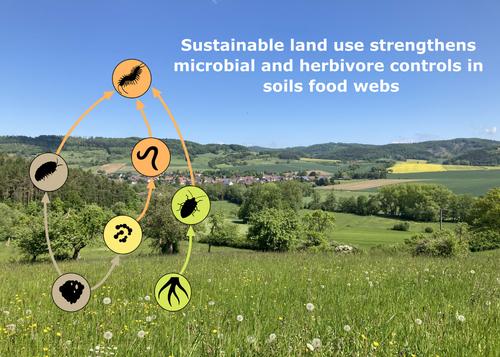当前位置:
X-MOL 学术
›
Glob. Change Biol.
›
论文详情
Our official English website, www.x-mol.net, welcomes your
feedback! (Note: you will need to create a separate account there.)
Sustainable Land Use Strengthens Microbial and Herbivore Controls in Soil Food Webs in Current and Future Climates
Global Change Biology ( IF 10.8 ) Pub Date : 2024-11-15 , DOI: 10.1111/gcb.17554 Marie Sünnemann, Andrew D. Barnes, Angelos Amyntas, Marcel Ciobanu, Malte Jochum, Alfred Lochner, Anton M. Potapov, Thomas Reitz, Benjamin Rosenbaum, Martin Schädler, Anja Zeuner, Nico Eisenhauer
Global Change Biology ( IF 10.8 ) Pub Date : 2024-11-15 , DOI: 10.1111/gcb.17554 Marie Sünnemann, Andrew D. Barnes, Angelos Amyntas, Marcel Ciobanu, Malte Jochum, Alfred Lochner, Anton M. Potapov, Thomas Reitz, Benjamin Rosenbaum, Martin Schädler, Anja Zeuner, Nico Eisenhauer

|
Climate change and land‐use intensification are threatening soil communities and ecosystem functions. Understanding the combined effects of climate change and land use is crucial for predicting future impacts on soil biodiversity and ecosystem functioning in agroecosystems. Here, we used a field experiment to quantify the combined effects of climate change (warming and altered precipitation patterns) and land use (agricultural type and management intensity) on soil food webs across nematodes, micro‐, and macroarthropods. Specifically, we investigated two types of agricultural systems—croplands and grasslands—under both high‐ and low‐intensity management. We focused on assessing the functioning of soil food webs by investigating changes in energy flux to consumers in the main trophic groups: decomposers, microbivores, herbivores, and predators. While the total energy flux and detritivory, herbivory and predation in the soil food web remained unchanged across treatments, low‐intensity land use—compared to high intensity—led to higher microbivory and microbial control under future climate conditions (i.e., warming and summer drought) in croplands and grasslands. At the same time, microbial and herbivore control were higher under low‐intensity land use in croplands and grasslands. Overall, our results underscore the potential benefits of less intensive, more sustainable management practices for soil food‐web functioning under current and future climate scenarios.
中文翻译:

可持续土地利用加强了当前和未来气候下土壤食物网中的微生物和食草动物控制
气候变化和土地利用集约化正在威胁土壤群落和生态系统功能。了解气候变化和土地利用的综合影响对于预测未来对农业生态系统中土壤生物多样性和生态系统功能的影响至关重要。在这里,我们使用了田间实验来量化气候变化(变暖和降水模式改变)和土地利用(农业类型和管理强度)对线虫、微型和大型节肢动物土壤食物网的综合影响。具体来说,我们研究了高强度和低强度管理下的两种类型的农业系统——农田和草原。我们专注于通过研究主要营养群体(分解者、微生物食动物、食草动物和捕食者)中消费者的能量通量变化来评估土壤食物网的功能。虽然土壤食物网中的总能量通量和碎屑食性、食草性和捕食性在不同处理中保持不变,但与高强度相比,低强度土地利用导致未来气候条件(即变暖和夏季干旱)农田和草原的微生物食性和微生物控制水平更高。同时,在农田和草原的低强度土地利用下,微生物和食草动物的控制程度更高。总体而言,我们的结果强调了在当前和未来气候情景下,强度较低、更可持续的管理实践对土壤食物网功能的潜在好处。
更新日期:2024-11-15
中文翻译:

可持续土地利用加强了当前和未来气候下土壤食物网中的微生物和食草动物控制
气候变化和土地利用集约化正在威胁土壤群落和生态系统功能。了解气候变化和土地利用的综合影响对于预测未来对农业生态系统中土壤生物多样性和生态系统功能的影响至关重要。在这里,我们使用了田间实验来量化气候变化(变暖和降水模式改变)和土地利用(农业类型和管理强度)对线虫、微型和大型节肢动物土壤食物网的综合影响。具体来说,我们研究了高强度和低强度管理下的两种类型的农业系统——农田和草原。我们专注于通过研究主要营养群体(分解者、微生物食动物、食草动物和捕食者)中消费者的能量通量变化来评估土壤食物网的功能。虽然土壤食物网中的总能量通量和碎屑食性、食草性和捕食性在不同处理中保持不变,但与高强度相比,低强度土地利用导致未来气候条件(即变暖和夏季干旱)农田和草原的微生物食性和微生物控制水平更高。同时,在农田和草原的低强度土地利用下,微生物和食草动物的控制程度更高。总体而言,我们的结果强调了在当前和未来气候情景下,强度较低、更可持续的管理实践对土壤食物网功能的潜在好处。






























 京公网安备 11010802027423号
京公网安备 11010802027423号